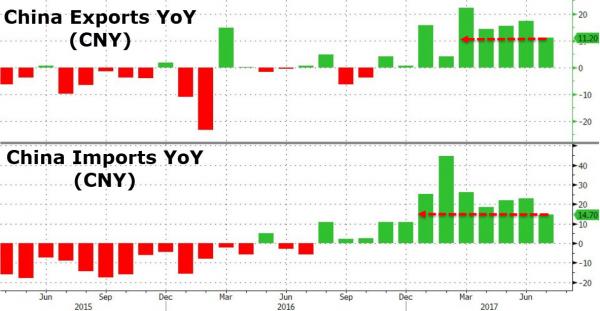Following a sleepy overnight session, US futures are flat as are markets in Europe, while Asian stocks rose despite overnight trade data from China which unexpectedly missed across the board. As reported last night, Chinese export growth was the slowest since February while Import growth the weakest since Dec 2016, as both missed consensus estimates.

Paradoxically, the bad report sent the MSCI EM Asia stock index higher for a third day to its highest since November 2007, with the poor Chinese trade data promptly spun as positive: “It looks like China’s trade data is taken as a half-full omen with the softer (than expected) exports mitigating risks of U.S. protectionism,†said Vishnu Varathan, head of economics and strategy at Mizuho Bank in Singapore.”
Continuing an unprecedented run of record highs, global stocks inched up to a new all-time high on Tuesday, shrugging off China’s data. The MSCI’s all-country world index ticked up to set a new record high at 480.76 points. It was last up less than 0.1 percent at 480.54 points. The index, which tracks shares in 46 countries, is on track for longest monthly winning streak since 2003. According to Reuters, “shares across the globe have been hitting record highs in record low volatility supported by a benign environment for global growth.”
“Data continue to suggest a synchronized global expansion across both advanced and emerging market economies. Spill-overs from the rebound in emerging market demand are reflected in the fastest growth in world trade since 2010,” said Fitch chief economist Brian Coulton.
The Chinese trade data was so poor, pardon great, the Chinese yuan (and South Korean won) led gains as emerging Asian currencies advance on a broadly weaker U.S. dollar.The onshore yuan strengthened as much as 0.4% to 6.6970 vs USD for biggest intraday rally since July 27, rising above 6.7 for the first time since October.

In currency markets, the dollar dipped for a second consecutive day after rising on Friday following stronger-than-expected U.S. jobs numbers, which some analysts said bolstered the case for the Federal Reserve to raise interest rates further. However, many in markets remain unpersuaded the Fed will increase the cost of borrowing again this year. St Louis Fed President James Bullard said on Monday the central bank could leave rates where they are for now because inflation was not likely to rise much.
“(They) seemed to oppose further rate hikes. That means they exactly reflect the current market expectations, which are limiting the dollar’s appreciation,” wrote analysts at Commerzbank in Frankfurt in a morning note to clients. “It is still inflation that poses the problem,” they added
Overnight the Aussie dollar advanced on rising business confidence but – unlike the Yuan – was weighed down by disappointing China trade data. The Euro rose for second day as upside momentum remains strong, and last Friday’s strong payrolls beat is largely forgotten. West Texas Intermediate crude started on the back foot but reversed during European hours; WTI crude continued its rise, and is rapidly approaching $50 again: the question is whether it can take out the resistance level and hold above it.Â
This morning, all eyes will be on the South Africa’s rand as lawmakers prepare to decide the fate of President Jacob Zuma in a secret ballot at 2:00pm local time (8:00am ET). The currency steadied after yesterday’s jump even as 1-week implied vol surged to a 4 month high.

Markets remain in a holding pattern, with investors seeking catalysts amid the summer slowdown and the S&P hasn’t moved more than 0.3% intraday for 13 consecutive days: the longest stretch on record. The focal point of this week looks set to be Friday’s U.S. inflation data, which will be key to the interest-rate outlook of the world’s biggest economy, Bloomberg writes. Two Federal Reserve officials said on Monday that soft inflation was a problem, but played down the risk of market disruption when the central bank starts shrinking its balance sheet.
“Markets are in sleep mode,†Hussein Sayed, a strategist at Forextime Ltd., a retail currency broker, wrote in an emailed note. “Limited news flow is what can be blamed for the narrow trading ranges, but expect this to change as we get closer to Friday’s U.S. CPI release.â€
MSCI’s broadest index of Asia-Pacific shares outside Japan proved relatively resilient, inching up 0.2 percent and back toward decade highs. Hong Kong’s Hang Seng closed up 0.6 percent. South Korea dipped 0.2 percent, while Japan’s Nikkei eased 0.3 percent and China’s main markets edged up 0.1 percent.Japan’s Topix index fell 0.2 percent at the close with SoftBank Group Co. declining even after profit topped estimates. Sony Corp. gained after it was added to the JPX-Nikkei Index 400. Australia’s S&P/ASX 200 Index lost 0.5 percent and South Korea’s Kospi index dropped 0.2 percent.
The Stoxx Europe 600 Index was slightly weaker, headed for a second day of declines as most benchmark gauges in the region fell, though moves were not large. Germany’s DAX Index declined less than 0.05 percent while the U.K.’s FTSE 100 Index sank 0.1 percent. The MSCI All-Country World Index rose less than 0.05 percent to the highest on record. Energy company shares rose as oil prices steadied from recent falls as sources told Reuters Saudi Arabia would cut crude supplies next month.

